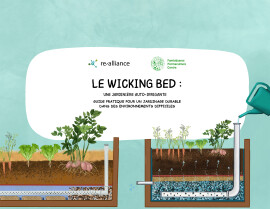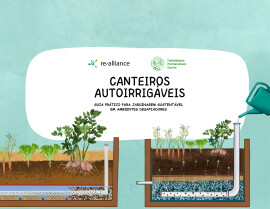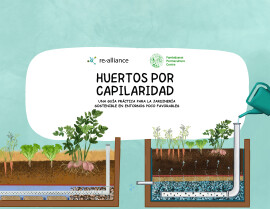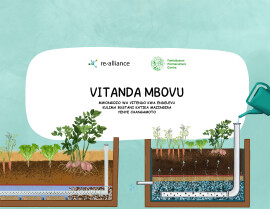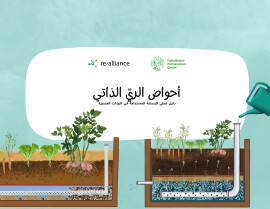
Peasants and the Art of Farming
A Chayanovian Manifesto
Peasants and the Art of Farming: A Chayanovian Manifesto focuses on the structure and dynamics of peasant farms and the historically highly variable relations that govern the processes of labour and production within peasant farms. Jan Douwe van der Ploeg argues that peasant agriculture can play an important, if not central, role in augmenting food production and creating sustainability. However, peasants today, as in the past, are materially neglected. By building on the pioneering work of Chayanov, this book seeks to address this neglect and to show how important peasants are in the ongoing struggles for food, food sustainability and food sovereignty.
Series: Agrarian Change & Peasant Studies
Published: 2013
Pages: 144
eBook: 9781780448763
Paperback: 9781853398773
Hardback: 9781853398766
| Prelims [ICAS Agrarian Change and Peasant Studies | Series Acknowledgements | Preface] | |||
|---|---|---|---|
| 1 Peasants and Social Transformations | |||
| The Political Relevance of Peasant Theory | |||
| Peasant Agriculture and Capitalism | |||
| What Makes Chayanov a “Genius”? | |||
| A Proof of Pedigree | |||
| 2 The Two Main Balances Identified by Chayanov | |||
| The Peasant Unit of Production: No Wages, No Capital | |||
| The Labour-Consumer Balance | |||
| The Political Relevance of the Labour-Consumer Balance | |||
| The Scientific Relevance of the Labour-Consumer Balance | |||
| The Balance of Utility and Drudgery | |||
| On “Subjective Evaluation” | |||
| Self-Exploitation | |||
| 3 A Wider Array of Interacting Balances | |||
| The Balance between People and Living Nature | |||
| The Balance of Production and Reproduction | |||
| The Balance of Internal and External Resources | |||
| The Balance of Autonomy and Dependence | |||
| The Balance of Scale and Intensity (and the Emergence of Farming Styles) | |||
| Fighting for Progress in an Adverse Environment | |||
| By Way of Synthesis: The Peasant Farm | |||
| A Final Note on Differentiation | |||
| 4 The Position of Peasant Agriculture in the Wider Context | |||
| Town-Countryside Relations | |||
| as Mediated by Exchange Relations | |||
| Town-Countryside Relations as Mediated by Migration | |||
| Farming Versus the Processing and Marketing of Food | |||
| State-Peasantry Relations | |||
| The Balance of Agrarian Growth and Demographic Growth | |||
| 5 Yields | |||
| Current Mechanisms of Labour Driven Intensification | |||
| The Significance and Reach of Labour Driven Intensification | |||
| When Labour Driven Intensification is Blocked | |||
| What Propels Labour Driven Intensification? | |||
| Intensification and the Role of Agrarian Sciences | |||
| Can Peasants Feed the World? | |||
| 6 Repeasantization | |||
| Processes and Expressions of Repeasantization | |||
| Repeasantization in Western Europe: Resetting the Balances | |||
| Back Matter [Glossary | References | Index] |
Jan Douwe van der Ploeg
Jan Douwe van der Ploeg is a professor of rural sociology at Wageningen University in the Netherlands and at China Agricultural University in Beijing.
New Farmer Identity: The Emergence of a Post‐Productivist Agricultural Regime in China
Xie, Xiaoru
Sociologia Ruralis, Vol. 61 (2021), Iss. 1 P.52
https://doi.org/10.1111/soru.12322 [Citations: 40]Between necessity and compulsion: opium poppy cultivation and the exigencies of survival in Badakhshan, Afghanistan
Pain, Adam
The Journal of Peasant Studies, Vol. 51 (2024), Iss. 4 P.902
https://doi.org/10.1080/03066150.2023.2216145 [Citations: 6]Notes on autonomy as an agroecological principle
Gonzalez de Molina, Manuel
Agroecology and Sustainable Food Systems, Vol. 50 (2026), Iss. 1 P.194
https://doi.org/10.1080/21683565.2025.2502092 [Citations: 1]Medium-scale commercial farms in Africa: the experience of the ‘native purchase areas’ in Zimbabwe
Scoones, Ian
Mavedzenge, Blasio
Murimbarimba, Felix
Africa, Vol. 88 (2018), Iss. 3 P.597
https://doi.org/10.1017/S0001972018000244 [Citations: 4]The political economy of agroecological transitions: key analytical dimensions
McKay, Ben M.
Nehring, Ryan
Catacora-Vargas, Georgina
The Journal of Peasant Studies, Vol. 52 (2025), Iss. 3 P.461
https://doi.org/10.1080/03066150.2024.2399138 [Citations: 12]Autonomy and repeasantization: Conceptual, analytical, and methodological problems
Jansen, Kees
Vicol, Mark
Nikol, Lisette
Journal of Agrarian Change, Vol. 22 (2022), Iss. 3 P.489
https://doi.org/10.1111/joac.12468 [Citations: 27]The evolving force of community: peasant uprisings and post-agrarian aspirations in Ecuador
Lyall, Angus
Colloredo-Mansfeld, Rudi
The Journal of Peasant Studies, Vol. 51 (2024), Iss. 7 P.1606
https://doi.org/10.1080/03066150.2024.2304799 [Citations: 0]Can food sovereignty be institutionalised? Insights from the Cuban experience
Botella‐Rodríguez, Elisa
González‐Esteban, Ángel Luis
Journal of Agrarian Change, Vol. 25 (2025), Iss. 1
https://doi.org/10.1111/joac.12608 [Citations: 1]Wind Struggles: Grabbing Value and Cultivating Dignity in Southern Catalonia
Franquesa, Jaume
Capitalism Nature Socialism, Vol. 33 (2022), Iss. 4 P.18
https://doi.org/10.1080/10455752.2022.2165259 [Citations: 8]Migration, Agriculture and Rural Development
Rural World, Migration, and Agriculture in Mediterranean EU: An Introduction
Nori, Michele
Farinella, Domenica
2020
https://doi.org/10.1007/978-3-030-42863-1_1 [Citations: 1]A comment on Henry Bernstein's way with peasants, and food sovereignty
McMichael, Philip
The Journal of Peasant Studies, Vol. 42 (2015), Iss. 1 P.193
https://doi.org/10.1080/03066150.2014.936853 [Citations: 44]Blind spots and spotlights in bureaucratic politics: An analysis of policy co‐production in environmental governance dynamics in Indonesia
Sahide, Muhammad Alif K.
Fisher, Micah R.
Sirimorok, Nurhady
Faturachmat, Fatwa
Dhiaulhaq, Ahmad
Maryudi, Ahmad
Batiran, Karno B.
Supratman, Supratman
Development Policy Review, Vol. 41 (2023), Iss. 5
https://doi.org/10.1111/dpr.12693 [Citations: 4]What’s Natural About Capital? Agroecology as Resistance to the New Frontier of Colonial Capitalist Carbon Farming
Jonas, Tammi
Capitalism Nature Socialism, Vol. 35 (2024), Iss. 3 P.43
https://doi.org/10.1080/10455752.2024.2360890 [Citations: 1]Syndromes of production and tree-cover dynamics of Neotropical grazing land
Valencia Mestre, Mariana C.
Ferguson, Bruce G.
Vandermeer, John
Agroecology and Sustainable Food Systems, Vol. 43 (2019), Iss. 4 P.362
https://doi.org/10.1080/21683565.2018.1483994 [Citations: 5]Peasant balances and agroecological scaling in Puerto Rican coffee farming
McCune, Nils
Perfecto, Ivette
Avilés-Vázquez, Katia
Vázquez-Negrón, Jesús
Vandermeer, John
Agroecology and Sustainable Food Systems, Vol. 43 (2019), Iss. 7-8 P.810
https://doi.org/10.1080/21683565.2019.1608348 [Citations: 16]Potatoes, Petty Commodity Producers and Livelihoods: Contract farming and agrarian change in Maharashtra, India
Vicol, Mark
Journal of Agrarian Change, Vol. 19 (2019), Iss. 1 P.135
https://doi.org/10.1111/joac.12273 [Citations: 46]Politically engaged, pluralist and internationalist: critical agrarian studies today
Borras, Saturnino M.
The Journal of Peasant Studies, Vol. 50 (2023), Iss. 2 P.449
https://doi.org/10.1080/03066150.2022.2163164 [Citations: 34]From feudal colonization to agrarian capitalism in Mallorca: Peasant endurance under the rise and fall of large estates (1229–1900)
Tello, Enric
Jover, Gabriel
Murray, Ivan
Fullana, Onofre
Soto, Ricard
Journal of Agrarian Change, Vol. 18 (2018), Iss. 3 P.483
https://doi.org/10.1111/joac.12253 [Citations: 15]Rethinking food regime as gender regime: agrarian change and the politics of social reproduction
Mincyte, Diana
The Journal of Peasant Studies, Vol. 51 (2024), Iss. 1 P.18
https://doi.org/10.1080/03066150.2022.2157720 [Citations: 12]Agrarian transformation in the Near East and North Africa: influences from the work of Lionel Cliffe
Bush, Ray
Review of African Political Economy, Vol. 43 (2016), Iss. sup1
https://doi.org/10.1080/03056244.2016.1217835 [Citations: 2]Agrarian anarchism and authoritarian populism: towards a more (state-)critical ‘critical agrarian studies’
Roman-Alcalá, Antonio
The Journal of Peasant Studies, Vol. 48 (2021), Iss. 2 P.298
https://doi.org/10.1080/03066150.2020.1755840 [Citations: 16]Neo-populist Fables: The Other World of A.V. Chayanov
Brass, Tom
Critical Sociology, Vol. 48 (2022), Iss. 7-8 P.1325
https://doi.org/10.1177/08969205211049271 [Citations: 1]Utopian visions of contemporary rural-urban Russia
Nikulin, Alexander Mikhailovich
Trotsuk, Irina Vladimirovna
Third World Thematics: A TWQ Journal, Vol. 1 (2016), Iss. 5 P.673
https://doi.org/10.1080/23802014.2016.1359065 [Citations: 3]Will work for food: agricultural interns, apprentices, volunteers, and the agrarian question
Ekers, Michael
Levkoe, Charles Z.
Walker, Samuel
Dale, Bryan
Agriculture and Human Values, Vol. 33 (2016), Iss. 3 P.705
https://doi.org/10.1007/s10460-015-9660-5 [Citations: 35]The existence of agriculture and the autonomy of peasant community
Pujiriyani, D W
Soetarto, E
IOP Conference Series: Earth and Environmental Science, Vol. 196 (2018), Iss. P.012045
https://doi.org/10.1088/1755-1315/196/1/012045 [Citations: 0]Peasant Poverty and Persistence in the Twenty‐first Century: Theories, Debates, Realities and PoliciesEdited by JulioBoltvinik and Susan ArcherMann. London: Zed Books, 2016. Pp. xvi + 456. £70.00 (hb), £24.99 (pb). ISBN: 978‐1‐78360‐844‐7 (hb), ISBN: 978‐1‐78360‐843‐0 (pb)
Kay, Cristóbal
Journal of Agrarian Change, Vol. 18 (2018), Iss. 1 P.214
https://doi.org/10.1111/joac.12236 [Citations: 0]The State of US Farm Operator Livelihoods
Burchfield, Emily K.
Schumacher, Britta L.
Spangler, Kaitlyn
Rissing, Andrea
Frontiers in Sustainable Food Systems, Vol. 5 (2022), Iss.
https://doi.org/10.3389/fsufs.2021.795901 [Citations: 29]Agroecology
Chapter 2 - History and Currents of Agroecological Thought
Rosset, Peter
Altieri, Miguel
2017
https://doi.org/10.3362/9781780449944.003 [Citations: 0]BEYOND THE ‘WILD SHEPHERD’: HOW GLOBAL CAPITALISM HAS RESHAPED PASTORALISM. SUGGESTIONS FROM A MEDITERRANEAN ISLAND
Farinella, Domenica
Nomadic Peoples, Vol. 28 (2024), Iss. 2 P.189
https://doi.org/10.3828/whpnp.63837646691055 [Citations: 2]Community‐based tourism, peasant agriculture and resilience in the face of COVID‐19 in Peru
Gascón, Jordi
Mamani, Kevin S.
Journal of Agrarian Change, Vol. 22 (2022), Iss. 2 P.362
https://doi.org/10.1111/joac.12447 [Citations: 31]Political Ecology
Theoretical Influences and Recent Directions
Benjaminsen, Tor A.
Svarstad, Hanne
2021
https://doi.org/10.1007/978-3-030-56036-2_2 [Citations: 0]Craftsmanship as a Carrier of Indigenous and Local Ecological Knowledge: Photographic Insights fromSámi Duodjiand Archipelago Fishing
Mellegård, Viveca
Boonstra, Wiebren J.
Society & Natural Resources, Vol. 33 (2020), Iss. 10 P.1252
https://doi.org/10.1080/08941920.2020.1729911 [Citations: 9]Glimpses of embodied utopias, why Moroccan and Swiss farmers engage in alternative agricultures
Mathez, Andrea
Agriculture and Human Values, Vol. 42 (2025), Iss. 1 P.227
https://doi.org/10.1007/s10460-024-10598-9 [Citations: 0]Simmering Tensions and Emerging Conflicts Among Key Group Actors Amid Capitalist Transformation in Northern Ghana
Wahab, Ibrahim
Yaro, Joseph A.
Afful‐Mensah, Gloria
Awen‐Naam, Michael B.
Journal of Agrarian Change, Vol. 25 (2025), Iss. 2
https://doi.org/10.1111/joac.12613 [Citations: 3]The value components of contract farming in contemporary capitalism
Dubb, Alex
Journal of Agrarian Change, Vol. 18 (2018), Iss. 4 P.722
https://doi.org/10.1111/joac.12260 [Citations: 6]Constructing a New Framework for Rural Development
Introduction
Milone, Pierluigi
Ventura, Flaminia
Ye, Jingzhong
2015
https://doi.org/10.1108/S1057-192220150000022021 [Citations: 2]Communist Manifesto and the peasantry of the 21st century
Šljukić, Srđan
Šljukić, Marica
Socioloski pregled, Vol. 52 (2018), Iss. 4 P.607
https://doi.org/10.5937/socpreg52-17800 [Citations: 1]Accumulation by agricultural extension: Freedom and financial extractivism among Brazil's Landless Rural Workers' Movement (MST)
DeVore, Jonathan
Journal of Agrarian Change, Vol. 22 (2022), Iss. 4 P.787
https://doi.org/10.1111/joac.12475 [Citations: 2]Extracting labour from the neighbour: class dynamics of agrarian change in Sumatran oil palm
Habibi, Muchtar
The Journal of Peasant Studies, Vol. 50 (2023), Iss. 4 P.1317
https://doi.org/10.1080/03066150.2022.2026330 [Citations: 7]Agriculture and the Generation Problem
3. Growing Up Rural
White, Ben
2020
https://doi.org/10.3362/9781780447421.003 [Citations: 0]Digital tools for local farmers: Thinking with spreadsheets in the wake of the COVID‐19 pandemic
Flachs, Andrew
Raturi, Ankita
Low, Megan
Miller, Valerie
Norton, Juliet
Redmond, Celeste
Thomas, Haley
Culture, Agriculture, Food and Environment, Vol. 46 (2024), Iss. 1 P.36
https://doi.org/10.1111/cuag.12316 [Citations: 2]Re-conceptualizing and decolonizing resilience from a peasant perspective
Santiago-Vera, T.
Rosset, P.M.
Saldivar, A.
Ferguson, B.G.
Méndez, V.E.
Agroecology and Sustainable Food Systems, Vol. 45 (2021), Iss. 10 P.1422
https://doi.org/10.1080/21683565.2021.1952362 [Citations: 14]Contributions of a feminist perspective to the analysis of farm viability: the livelihoods reproduction framework
Manuel, Judit
Rivera-Ferre, Marta G.
López-i-Gelats, Feliu
The Journal of Peasant Studies, Vol. 51 (2024), Iss. 1 P.185
https://doi.org/10.1080/03066150.2023.2210500 [Citations: 4]‘We go back to the land’: processes of re-peasantisation in Araponga, Brazil
van den Berg, Leonardo
Hebinck, Paul
Roep, Dirk
The Journal of Peasant Studies, Vol. 45 (2018), Iss. 3 P.653
https://doi.org/10.1080/03066150.2016.1250746 [Citations: 17]Marx and Chayanov at the margins: understanding agrarian change in Java
White, Ben
The Journal of Peasant Studies, Vol. 45 (2018), Iss. 5-6 P.1108
https://doi.org/10.1080/03066150.2017.1419191 [Citations: 47]Natural powers: from the bio-economy to the eco-economy and sustainable place-making
Marsden, Terry
Farioli, Francesca
Sustainability Science, Vol. 10 (2015), Iss. 2 P.331
https://doi.org/10.1007/s11625-014-0287-z [Citations: 73]Agriculture, Environment and Development
The Difficult but Not Impossible Defeating of Right-Wing Populism and the Exploration of a Socialist Future
Borras, Saturnino M.
2022
https://doi.org/10.1007/978-3-031-10264-6_17 [Citations: 0]Labour and landscape husbandry in the Nepali mid hills: people, livestock and trees
Marquardt, Kristina
Khatri, Dil
Pain, Adam
(2025) P.1
https://doi.org/10.1080/03066150.2025.2566147 [Citations: 0]Agriculture and the Generation Problem
1. The Generational Dimension in Agrarian Change
White, Ben
2020
https://doi.org/10.3362/9781780447421.001 [Citations: 0]Why mobile phone matters: The role of ICT in promoting farmers’ access to agricultural information and extension services in a tea outgrowing scheme in Tanzania
Ndimbo, Gabriel Kanuti
Gu, Jiaming
Haulle, Evaristo
Yu, Lerong
(2024)
https://doi.org/10.1177/02666669241284235 [Citations: 6]Belowground and Aboveground Sustainability: Historical Management Change in a Mediterranean Agroecosystem (Les Oluges, Spain, 1860–1959-1999)
Díez, Lucía
Olarieta, José Ramón
Tello, Enric
Human Ecology, Vol. 47 (2019), Iss. 5 P.639
https://doi.org/10.1007/s10745-019-00105-8 [Citations: 4]European Landscapes in Transition: Implications for Policy Integration and Landscape Governance
Primdahl, Jørgen
Pinto‐Correia, Teresa
Pedroli, Bas
EuroChoices, Vol. 18 (2019), Iss. 3 P.18
https://doi.org/10.1111/1746-692X.12211 [Citations: 8]Food sovereignty via the ‘peasant way’: a sceptical view
Bernstein, Henry
The Journal of Peasant Studies, Vol. 41 (2014), Iss. 6 P.1031
https://doi.org/10.1080/03066150.2013.852082 [Citations: 280]The vanishing exception: republican and reactionary specters of populism in rural Spain
Franquesa, Jaume
The Journal of Peasant Studies, Vol. 46 (2019), Iss. 3 P.537
https://doi.org/10.1080/03066150.2019.1578751 [Citations: 24]Race, immigration and the agrarian question: farmworkers becoming farmers in the United States
Minkoff-Zern, Laura-Anne
The Journal of Peasant Studies, Vol. 45 (2018), Iss. 2 P.389
https://doi.org/10.1080/03066150.2017.1293661 [Citations: 25]Repeasantisation in The United States
Nelson, Jon
Stock, Paul
Sociologia Ruralis, Vol. 58 (2018), Iss. 1 P.83
https://doi.org/10.1111/soru.12132 [Citations: 19]Re-reading Nepalese landscapes: labour, water, farming patches and trees
Marquardt, Kristina
Pain, Adam
Khatri, Dil Bahadur
Forests, Trees and Livelihoods, Vol. 29 (2020), Iss. 4 P.238
https://doi.org/10.1080/14728028.2020.1814875 [Citations: 13]“Listen to us”: small-scale farmers’ understandings of social-ecological changes and their drivers in Important Agricultural Heritage Systems
Caviedes, Julián
Ibarra, José Tomás
Calvet-Mir, Laura
Junqueira, André Braga
Regional Environmental Change, Vol. 23 (2023), Iss. 4
https://doi.org/10.1007/s10113-023-02145-9 [Citations: 12]Some Reflections on Agrarian Change in China
Bernstein, Henry
Journal of Agrarian Change, Vol. 15 (2015), Iss. 3 P.454
https://doi.org/10.1111/joac.12116 [Citations: 30]Pious pioneers: the expansion of Mennonite colonies in Latin America
le Polain de Waroux, Yann
Neumann, Janice
O’Driscoll, Anna
Schreiber, Kerstin
Journal of Land Use Science, Vol. 16 (2021), Iss. 1 P.1
https://doi.org/10.1080/1747423X.2020.1855266 [Citations: 12]Family Farmers as Agents in the Struggle for Survival: A Case Study from Turkey☆
Sevgili Canpolat, Ebru
Rural Sociology, Vol. 89 (2024), Iss. 4 P.884
https://doi.org/10.1111/ruso.12568 [Citations: 0]Political Ecology, Food Regimes, and Food Sovereignty
The ‘First’ or British ‘Liberal’ Food Regime 1840–1870: The ‘Second’ or ‘Imperial’ Food Regime 1870–1930
Tilzey, Mark
2018
https://doi.org/10.1007/978-3-319-64556-8_4 [Citations: 1]Australia’s new peasantry: towards a politics and practice of custodianship on agroecology-oriented farms
Jonas, Tammi
Gressier, Catie
The Journal of Peasant Studies, Vol. 52 (2025), Iss. 2 P.215
https://doi.org/10.1080/03066150.2024.2368857 [Citations: 5]Commentary: Food regime analysis and agrarian questions: widening the conversation
Friedmann, Harriet
The Journal of Peasant Studies, Vol. 43 (2016), Iss. 3 P.671
https://doi.org/10.1080/03066150.2016.1146254 [Citations: 78]What, then, is a Chinese peasant? Nongmin discourses and agroindustrialization in contemporary China
Schneider, Mindi
Agriculture and Human Values, Vol. 32 (2015), Iss. 2 P.331
https://doi.org/10.1007/s10460-014-9559-6 [Citations: 74]Tapping into nature’s benefits: values, effort and the struggle to co-produce pine resin
Heinze, Alan
Kuyper, Thomas W.
García Barrios, Luis E.
Ramírez Marcial, Neptalí
Bongers, Frans
Ecosystems and People, Vol. 17 (2021), Iss. 1 P.69
https://doi.org/10.1080/26395916.2021.1892827 [Citations: 11]Tree Management and Balancing Process Among Panamanian Farmers
Valencia Mestre, Mariana Cecilia
Hoey, Lesli
Vandermeer, John
Small-scale Forestry, Vol. 19 (2020), Iss. 4 P.541
https://doi.org/10.1007/s11842-020-09453-6 [Citations: 6]Agricultural Heritage Systems in Europe, Asia, Africa, Central and South America
Potential GIAHS Sites in Central and South America
Agnoletti, Mauro
Santoro, Antonio
Fiore, Beatrice
Piras, Francesco
Romano, Federica
Bazzurro, Alessandra
2023
https://doi.org/10.1007/978-3-031-44881-2_5 [Citations: 0]Food regimes and agrarian questions, by Philip McMichael
Tetreault, Darcy
Canadian Journal of Development Studies / Revue canadienne d'études du développement, Vol. 37 (2016), Iss. 1 P.121
https://doi.org/10.1080/02255189.2016.1117963 [Citations: 0]What is the “small farm”? Terminological incoherence in the literature and possible paths forward
Hazelett, Evan
Agriculture and Human Values, Vol. 42 (2025), Iss. 4 P.2859
https://doi.org/10.1007/s10460-025-10784-3 [Citations: 0]The political economy of agroecology
van der Ploeg, Jan Douwe
The Journal of Peasant Studies, Vol. 48 (2021), Iss. 2 P.274
https://doi.org/10.1080/03066150.2020.1725489 [Citations: 92]Becoming A Young Farmer
Introduction: Young People’s Pathways into Farming
Srinivasan, Sharada
White, Ben
2024
https://doi.org/10.1007/978-3-031-15233-7_1 [Citations: 3]“Taken-left” dynamics? Rethink the livelihood changes of affected villagers in the era of the global land rush
Xu, Yunan
Agriculture and Human Values, Vol. 40 (2023), Iss. 3 P.1171
https://doi.org/10.1007/s10460-022-10404-4 [Citations: 5]Socio-Metabolic Perspectives on the Sustainability of Local Food Systems
Methodological Challenges and General Criteria for Assessing and Designing Local Sustainable Agri-Food Systems: A Socio-Ecological Approach at Landscape Level
Tello, Enric
González de Molina, Manuel
2017
https://doi.org/10.1007/978-3-319-69236-4_2 [Citations: 14]Emancipatory agroecologies: social and political principles
Giraldo, Omar Felipe
Rosset, Peter Michael
The Journal of Peasant Studies, Vol. 50 (2023), Iss. 3 P.820
https://doi.org/10.1080/03066150.2022.2120808 [Citations: 46]Autonomy as a politico‐economic concept: Peasant practices and nested markets
van der Ploeg, Jan Douwe
Schneider, Sergio
Journal of Agrarian Change, Vol. 22 (2022), Iss. 3 P.529
https://doi.org/10.1111/joac.12482 [Citations: 23]Social differentiation of the peasantry (Chayanovian)
van der Ploeg, Jan Douwe
The Journal of Peasant Studies, Vol. 50 (2023), Iss. 4 P.1261
https://doi.org/10.1080/03066150.2023.2170792 [Citations: 2]Broadening the Land Question in Food Sovereignty to Northern Settings: A Case Study of Occupy the Farm
Roman-Alcalá, Antonio
Globalizations, Vol. 12 (2015), Iss. 4 P.545
https://doi.org/10.1080/14747731.2015.1033199 [Citations: 28]More than energy transformations: a historical transition from organic to industrialized farm systems in a Mediterranean village (Les Oluges, Catalonia, 1860–1959–1999)
Díez, Lucía
Cussó, Xavier
Padró, Roc
Marco, Inés
Cattaneo, Claudio
Olarieta, José Ramón
Garrabou, Ramón
Tello, Enric
International Journal of Agricultural Sustainability, Vol. 16 (2018), Iss. 4-5 P.399
https://doi.org/10.1080/14735903.2018.1520382 [Citations: 15]Crisis and Post-Crisis in Rural Territories
Return to the Land in Times of Crisis: Experiences, Policies and Narratives in an Inner Periphery of Southern Italy
Ebbreo, Carlotta
2020
https://doi.org/10.1007/978-3-030-50581-3_6 [Citations: 0]Land and food sovereignty
Borras, Saturnino M.
Franco, Jennifer C.
Suárez, Sofía Monsalve
Third World Quarterly, Vol. 36 (2015), Iss. 3 P.600
https://doi.org/10.1080/01436597.2015.1029225 [Citations: 78]Becoming a New Farmer: Agrarianism and the Contradictions of Diverse Economies*
Suryanata, Krisnawati
Mostafanezhad, Mary
Milne, Nicole
Rural Sociology, Vol. 86 (2021), Iss. 1 P.139
https://doi.org/10.1111/ruso.12355 [Citations: 21]Rethinking the Alternatives: Food Sovereignty as a Prerequisite for Sustainable Food Security
Byaruhanga, Ronald
Isgren, Ellinor
Food Ethics, Vol. 8 (2023), Iss. 2
https://doi.org/10.1007/s41055-023-00126-6 [Citations: 34]The ‘peasant problem’ in the Russian revolution(s), 1905–1929
Bernstein, Henry
The Journal of Peasant Studies, Vol. 45 (2018), Iss. 5-6 P.1127
https://doi.org/10.1080/03066150.2018.1428189 [Citations: 27]La resignificación campesinista de la ruralidad: La Universidad Rural Paulo Freire
Gallar Hernández, David
Revista de Dialectología y Tradiciones Populares, Vol. 69 (2014), Iss. 2 P.285
https://doi.org/10.3989/rdtp.2014.02.002 [Citations: 7]Conceptualising components, conditions and trajectories of food sovereignty’s ‘sovereignty’
Roman-Alcalá, Antonio
Third World Quarterly, Vol. 37 (2016), Iss. 8 P.1388
https://doi.org/10.1080/01436597.2016.1142366 [Citations: 17]Heritage and patrimony of the peasantry framework to address rural development and its application in Colombia
Pachón Ariza, Fabio Alberto
Bokelmann, Wolfgang
Ramírez Miranda, César Adrián
Acta Agronómica, Vol. 66 (2017), Iss. 3 P.347
https://doi.org/10.15446/acag.v66n3.60949 [Citations: 2]La Via Campesina – transforming agrarian and knowledge politics, and co-constructing a field: alaudatio
Borras, Saturnino M.
The Journal of Peasant Studies, Vol. 50 (2023), Iss. 2 P.691
https://doi.org/10.1080/03066150.2023.2176760 [Citations: 29]Land Tenure Transitions in the Global South: Trends, Drivers, and Policy Implications
Rudel, Thomas K.
Hernandez, Monica
Annual Review of Environment and Resources, Vol. 42 (2017), Iss. 1 P.489
https://doi.org/10.1146/annurev-environ-102016-060924 [Citations: 16]Political Dynamics of Transnational Agrarian Movements
2 - Internally Differentiated TAMs: Competing Class, Identity and Ideological Interests
Edelman, Marc
Borras, Saturnino M.
2016
https://doi.org/10.3362/9781780449142.003 [Citations: 0]The montane multifunctional landscape: How stakeholders in a biosphere reserve derive benefits and address trade-offs in ecosystem service supply
Heinze, Alan
Bongers, Frans
Ramírez Marcial, Neptalí
García Barrios, Luis
Kuyper, Thomas W.
Ecosystem Services, Vol. 44 (2020), Iss. P.101134
https://doi.org/10.1016/j.ecoser.2020.101134 [Citations: 18]Agrarian political economy and modern world capitalism: the contributions of food regime analysis
Bernstein, Henry
The Journal of Peasant Studies, Vol. 43 (2016), Iss. 3 P.611
https://doi.org/10.1080/03066150.2015.1101456 [Citations: 155]Small‐Scale Village Farmers, Farming Imaginaries and Enrichment Value Creation in Ankara, Turkey
Atasoy, Yıldız
(2025)
https://doi.org/10.1111/joac.70042 [Citations: 0]Value, (use) values, and the ecologies of capital: On social form, meaning, and the contested production of nature.
Andueza, Luis
Progress in Human Geography, Vol. 45 (2021), Iss. 5 P.1105
https://doi.org/10.1177/0309132520947473 [Citations: 19]What kind of labour regime is contract farming? Contracting and sharecropping in Java compared
White, Ben
Wijaya, Hanny
Journal of Agrarian Change, Vol. 22 (2022), Iss. 1 P.19
https://doi.org/10.1111/joac.12459 [Citations: 19]Economic Sustainability of Small-Scale Aquaponic Systems for Food Self-Production
Lobillo-Eguíbar, José
Fernández-Cabanás, Víctor M.
Bermejo, Luis Alberto
Pérez-Urrestarazu, Luis
Agronomy, Vol. 10 (2020), Iss. 10 P.1468
https://doi.org/10.3390/agronomy10101468 [Citations: 41]Why do farmers' cooperatives fail in a market economy? Rediscovering Chayanov with the Chinese experience
Hu, Zhanping
Zhang, Qian Forrest
Donaldson, John
The Journal of Peasant Studies, Vol. 50 (2023), Iss. 7 P.2611
https://doi.org/10.1080/03066150.2022.2104159 [Citations: 21]Confronting Complexity in Agroecology: Simple Models From Turing to Simon
Vandermeer, John
Frontiers in Sustainable Food Systems, Vol. 4 (2020), Iss.
https://doi.org/10.3389/fsufs.2020.00095 [Citations: 7]What is the Value of Value for Agrarian Studies?
Akram‐Lodhi, A. Haroon
Yadav, Srishti
Mezzadri, Alessandra
Taylor, Marcus
Journal of Agrarian Change, Vol. 25 (2025), Iss. 3
https://doi.org/10.1111/joac.70020 [Citations: 1]Bringing agroecology to scale: key drivers and emblematic cases
Mier y Terán Giménez Cacho, Mateo
Giraldo, Omar Felipe
Aldasoro, Miriam
Morales, Helda
Ferguson, Bruce G.
Rosset, Peter
Khadse, Ashlesha
Campos, Carmen
Agroecology and Sustainable Food Systems, Vol. 42 (2018), Iss. 6 P.637
https://doi.org/10.1080/21683565.2018.1443313 [Citations: 271]Social differentiation of the peasantry (Marxist)
Cousins, Ben
The Journal of Peasant Studies, Vol. 49 (2022), Iss. 7 P.1387
https://doi.org/10.1080/03066150.2022.2125805 [Citations: 14]Masters of the countryside and their enemies: Class dynamics of agrarian change in rural Java
Habibi, Muchtar
Journal of Agrarian Change, Vol. 21 (2021), Iss. 4 P.720
https://doi.org/10.1111/joac.12433 [Citations: 16]Regeneration at a distance from the state: From radical imaginaries to alternative practices in Dutch farming
Leitheiser, Stephen
Horlings, Ina
Franklin, Alex
Trell, Elen‐Maarja
Sociologia Ruralis, Vol. 62 (2022), Iss. 4 P.699
https://doi.org/10.1111/soru.12403 [Citations: 15]Agrarian social movements: The absurdly difficult but not impossible agenda of defeating right‐wing populism and exploring a socialist future
Borras, Saturnino M.
Journal of Agrarian Change, Vol. 20 (2020), Iss. 1 P.3
https://doi.org/10.1111/joac.12311 [Citations: 119]Food sovereignty and new peasantries: on re-peasantization and counter-hegemonic contestations in the Basque territory
Calvário, Rita
The Journal of Peasant Studies, Vol. 44 (2017), Iss. 2 P.402
https://doi.org/10.1080/03066150.2016.1259219 [Citations: 39]Beyond the “special period”: land reform, supermarkets and the prospects for peasant-driven food sovereignty in post-socialist Cuba (2008–2017)
Thiemann, Louis
Spoor, Max
Canadian Journal of Development Studies / Revue canadienne d'études du développement, Vol. 40 (2019), Iss. 4 P.546
https://doi.org/10.1080/02255189.2019.1632174 [Citations: 10]Shocks, states, and societal corporatism: a shorter path to sustainability?
Rudel, Thomas K.
Journal of Environmental Studies and Sciences, Vol. 9 (2019), Iss. 4 P.429
https://doi.org/10.1007/s13412-019-00560-1 [Citations: 3]Words speak louder than actions: the ‘peasant’ dimension of the Confédération Paysanne's alternative to industrial farming
Morena, Edouard
The Journal of Peasant Studies, Vol. 42 (2015), Iss. 1 P.45
https://doi.org/10.1080/03066150.2014.969716 [Citations: 9]Peasant balances, neoliberalism, and the stunted growth of non- traditional agro-exports in Haiti
Steckley, Marylynn
Weis, Tony
Canadian Journal of Latin American and Caribbean Studies / Revue canadienne des études latino-américaines et caraïbes, Vol. 41 (2016), Iss. 1 P.1
https://doi.org/10.1080/08263663.2015.1130293 [Citations: 8]Populism, Neoliberalism and Agrarian Movements in Europe. Understanding Rural Support for Right‐Wing Politics and Looking for Progressive Solutions
Mamonova, Natalia
Franquesa, Jaume
Sociologia Ruralis, Vol. 60 (2020), Iss. 4 P.710
https://doi.org/10.1111/soru.12291 [Citations: 92]We are not all the same: taking gender seriously in food sovereignty discourse
Park, Clara Mi Young
White, Ben
Third World Quarterly, Vol. 36 (2015), Iss. 3 P.584
https://doi.org/10.1080/01436597.2015.1002988 [Citations: 36]Russian to modern world history: Teodor Shanin and peasant studies
Bernstein, Henry
Journal of Agrarian Change, Vol. 21 (2021), Iss. 1 P.25
https://doi.org/10.1111/joac.12401 [Citations: 5]A qualitative approach to food loss. The case of the production of fruit in Lleida (Catalonia, Spain)
Gascón, Jordi
Solà, Carlota
Larrea-Killinger, Cristina
Agroecology and Sustainable Food Systems, Vol. 46 (2022), Iss. 5 P.736
https://doi.org/10.1080/21683565.2022.2061099 [Citations: 5]Farmer-farmworkers: cross-border wage labor in northeastern Vietnam-southwestern China region
Dang, Bao-Nguyet
Agriculture and Human Values, Vol. 42 (2025), Iss. 4 P.2521
https://doi.org/10.1007/s10460-025-10760-x [Citations: 1]Migration, Agriculture and Rural Development
Restructuring of Agriculture and the Rural World in Mediterranean EU Countries
Nori, Michele
Farinella, Domenica
2020
https://doi.org/10.1007/978-3-030-42863-1_2 [Citations: 2]Differentiation: old controversies, new insights
van der Ploeg, Jan Douwe
The Journal of Peasant Studies, Vol. 45 (2018), Iss. 3 P.489
https://doi.org/10.1080/03066150.2017.1337748 [Citations: 43]Eurasian Business and Economics Perspectives
Rural Development in the Context of Agricultural Models: Evidence from Bulgaria
Doitchinova, Julia
Miteva, Albena
2023
https://doi.org/10.1007/978-3-031-36286-6_9 [Citations: 0]Climate change, hunger and rural health through the lens of farming styles: An agent-based model to assess the potential role of peasant farming
Lloyd, Simon J.
Chalabi, Zaid
Zúniga-González, Carlos Alberto
PLOS ONE, Vol. 16 (2021), Iss. 2 P.e0246788
https://doi.org/10.1371/journal.pone.0246788 [Citations: 8]The Encyclopedia of Human Geography
Geography of Peasants
Cousins, Ben
2025
https://doi.org/10.1007/978-3-031-25900-5_89-1 [Citations: 0]Forum: Fifty years of debate on peasantries, 1966–2016
Bernstein, Henry
Friedmann, Harriet
van der Ploeg, Jan Douwe
Shanin, Teodor
White, Ben
The Journal of Peasant Studies, Vol. 45 (2018), Iss. 4 P.689
https://doi.org/10.1080/03066150.2018.1439932 [Citations: 50]Territories of hope: A human geography of agrarian politics in Brazil
Fernandes, Bernardo Mançano
Environment and Planning E: Nature and Space, Vol. 6 (2023), Iss. 3 P.1447
https://doi.org/10.1177/25148486221135303 [Citations: 1]A pluralist and pragmatist critique of food regime’s genealogy: varieties of social orders in Brazilian agriculture
Niederle, Paulo Andre
The Journal of Peasant Studies, Vol. 45 (2018), Iss. 7 P.1460
https://doi.org/10.1080/03066150.2017.1313238 [Citations: 26]How Agricultural Commercialization Impacts Migrants' Land Tenure: Unpacking Displacement and Tenurial Adaptations in Ghana's Agricultural Landscape
Kugbega, Selorm Kobla
The Journal of Peasant Studies, Vol. 51 (2024), Iss. 7 P.1530
https://doi.org/10.1080/03066150.2023.2300784 [Citations: 2]Farmers’ Seed Systems in Southern Africa: Alternatives to Philanthrocapitalism
Mushita, Andrew
Thompson, Carol
Agrarian South: Journal of Political Economy: A triannual Journal of Agrarian South Network and CARES, Vol. 8 (2019), Iss. 3 P.391
https://doi.org/10.1177/2277976019872327 [Citations: 3]The decline and transformation of smallholders in Chinese agriculture: national trends
Zhang, Qian Forrest
Wu, Meiling
The Journal of Peasant Studies, Vol. 52 (2025), Iss. 3 P.485
https://doi.org/10.1080/03066150.2024.2392688 [Citations: 7]In the shadow of state-led agrarian reforms: smallholder pervasiveness in rural China
Wilmsen, Brooke
Rogers, Sarah
van Hulten, Andrew
Yuefang, Duan
Agriculture and Human Values, Vol. 41 (2024), Iss. 1 P.75
https://doi.org/10.1007/s10460-023-10468-w [Citations: 12]Visions of sustainable development and the future of smallholder farmers in sub-Saharan Africa (and beyond)
Boda, Chad S.
Akorsu, Angela Dziedzom
Armah, Frederick Ato
Atwiine, Adrine
Byaruhanga, Ronald
Chambati, Walter
Ekumah, Bernard
Faran, Turaj
Hombey, Charles Tetteh
Isgren, Ellinor
Jerneck, Anne
Mazwi, Freedom
Mpofu, Elizabeth
Ndhlovu, Delmah
Ocen, Laury
Sibanda, Michaelin
Frontiers in Sustainable Food Systems, Vol. 8 (2024), Iss.
https://doi.org/10.3389/fsufs.2024.1357574 [Citations: 0]Resurgent back‐to‐the‐land and the cultivation of a renewed countryside
Sandström, Emil
Sociologia Ruralis, Vol. 63 (2023), Iss. 3 P.544
https://doi.org/10.1111/soru.12406 [Citations: 14]The debate on food sovereignty theory: agrarian capitalism, dispossession and agroecology
Jansen, Kees
The Journal of Peasant Studies, Vol. 42 (2015), Iss. 1 P.213
https://doi.org/10.1080/03066150.2014.945166 [Citations: 104]The curious case of ecological farm interns: on the populism and political economy of agro-ecological farm work
Ekers, Michael
The Journal of Peasant Studies, Vol. 46 (2019), Iss. 1 P.21
https://doi.org/10.1080/03066150.2018.1512487 [Citations: 14]Climate-smart agriculture: what is it good for?
Taylor, Marcus
The Journal of Peasant Studies, Vol. 45 (2018), Iss. 1 P.89
https://doi.org/10.1080/03066150.2017.1312355 [Citations: 259]Agricultural commercialization in the Mekong region: A meta-narrative review and policy implications
Nguyen, Anh-Thu
Oya, Carlos
Beban, Alice
Gironde, Christophe
Cole, Rob
Ehrensperger, Albrecht
Journal of Land Use Science, Vol. 18 (2023), Iss. 1 P.128
https://doi.org/10.1080/1747423X.2023.2191599 [Citations: 7]Cooperation as a survival strategy among west of Ireland small-scale mussel farmers
Cush, Peter
Varley, Tony
Maritime Studies, Vol. 12 (2013), Iss. 1
https://doi.org/10.1186/2212-9790-12-11 [Citations: 7]Commentary: Food regime for thought
McMichael, Philip
The Journal of Peasant Studies, Vol. 43 (2016), Iss. 3 P.648
https://doi.org/10.1080/03066150.2016.1143816 [Citations: 71]Fast Food Sovereignty: Contradiction in Terms or Logical Next Step?
Thiemann, Louis
Roman-Alcalá, Antonio
Journal of Agricultural and Environmental Ethics, Vol. 32 (2019), Iss. 5-6 P.813
https://doi.org/10.1007/s10806-019-09800-4 [Citations: 14]Making meat moral: A comparison of rearing and killing practices in Swedish cattle farming
Wernersson, Hanna Charlotta
Boonstra, Wiebren Johannes
Sociologia Ruralis, Vol. 64 (2024), Iss. 2 P.254
https://doi.org/10.1111/soru.12472 [Citations: 3]Building an agroecological model to understand the effects of agrochemical subsidies on farmer decisions
Bernal Hoyo, David
Giraldo, Omar Felipe
Rosset, Peter M.
López Corona, Oliver
Perez Cassarino, Julian
Nautiyal, Sunil
Agroecology and Sustainable Food Systems, Vol. 46 (2022), Iss. 5 P.712
https://doi.org/10.1080/21683565.2022.2039837 [Citations: 7]Consolidation d’une paysannerie émiettée…
Hooge, Roma
Landy, Frédéric
Noûs, Camille
Ruiz, Laurent
Études rurales, Vol. 209 (2022), Iss. P.162
https://doi.org/10.4000/etudesrurales.28942 [Citations: 2]Decolonisation agriculture: challenging colonisation through the reconstruction of agriculture in Western Kurdistan (Rojava)
Türk, Necmettin
Jongerden, Joost
Third World Quarterly, Vol. 45 (2024), Iss. 11 P.1738
https://doi.org/10.1080/01436597.2024.2374521 [Citations: 5]

